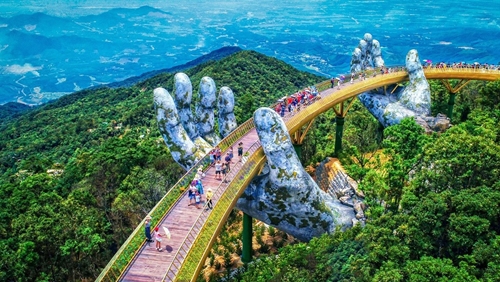According to Jones Lang Lasalle Property (JLL), the industrial renaissance has driven corporate demand for hotels across the country, while visa exemptions, new direct air routes and improved marketing have boosted the country’s appeal to leisure travellers.
Like much of Southeast Asia, leisure demand has been driven by mainland Chinese tourists which hit a record last year in terms of arrivals growth.
    |
 |
|
Golden Bridge in Da Nang. Photo for illustration |
Last year, Vietnam received 15.5 million international tourists, up 19.9 percent over 2017, according to the Vietnam National Administration of Tourism (VNAT).
The number of international visitors to Vietnam this October hit 14.5 million, 13 percent higher than the same month last year.
As the three biggest economic and tourism hubs, Ho Chi Minh City, Hanoi and Da Nang, see the tourist growth during the year and they also report the construction of more hotel rooms to serve demand.
By September, HCM City's tourist arrivals grew 14.3 percent compared to the same time last year. This year, the city has recorded 1,114 new hotel rooms, lifting overall supply to 20,200. By the end of 2021, its supply is forecast to hit 22,000 rooms, 55.4 percent of which will be in the upscale segment.
Tourist arrival growth in Hanoi was 9.5 percent up to September. In the fourth quarter this year, 1,008 rooms will be added to the capital city’s hotel landscape, increasing total supply to 18,699 rooms, with approximately 97 percent of the new supply in the midscale and upscale segments.
By the end of 2021, Hanoi will have more than 20,400 rooms with approximately 59.8 percent in the upscale segment.
With tourist growth of 26.1 percent by this July, during 2019-21 Da Nang expects to add 9,479 rooms to current supply, of which 81.8 percent are projected to be in the upscale and midscale segments.
Thanks to tourism and economic growth, the hotel transaction market in Vietnam has had a busy year.
According to realty experts, in Vietnam foreign investors are seeking investment opportunities with higher returns in operating hotel assets with in-place cash flow, while most domestic investors want to develop hotels and resorts from vacant land banks.
Some outstanding transactions in the market this year include Ho Tram Grand Strip resort's sale sold to Warburg Pincus investment fund, while Berjaya Group transferred 75 percent of TPC Nghi Tam village's shares to the Hanoi Hotel Tourism Development Co., Ltd.
TPC Nghi Tam village owns the Intercontinental Hotel in Hanoi with a value of more than 53.4 million USD.
On November 7, IHG (InterContinental Hotels Group) signed agreements with Ho Tram Project Company Limited (HTP) to rebrand The Grand Ho Tram at the Ho Tram Strip integrated resort to InterContinental Grand Ho Tram within a year.
Source: VNA